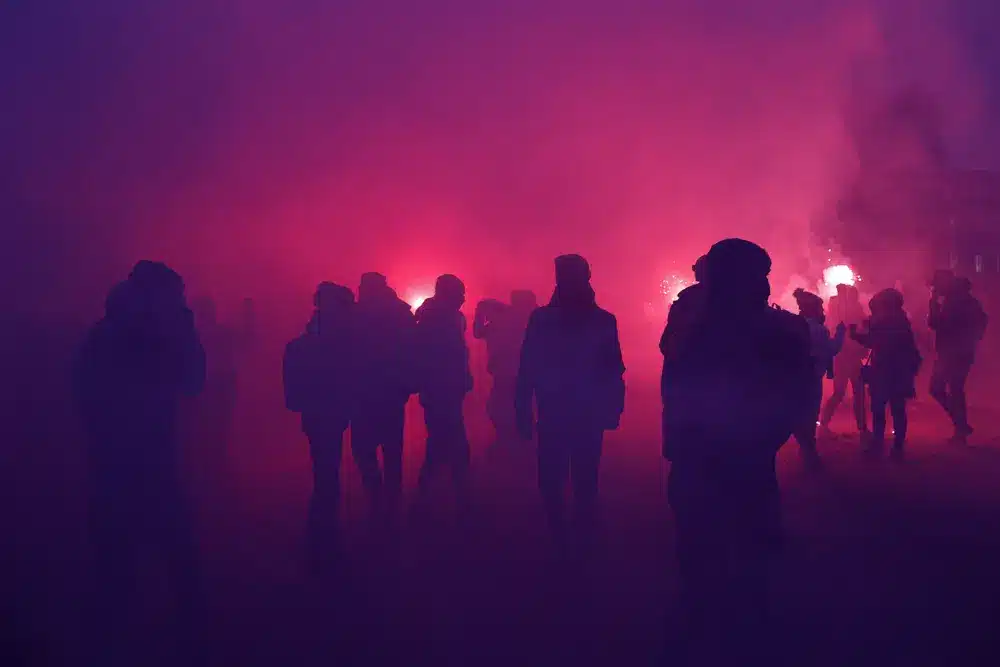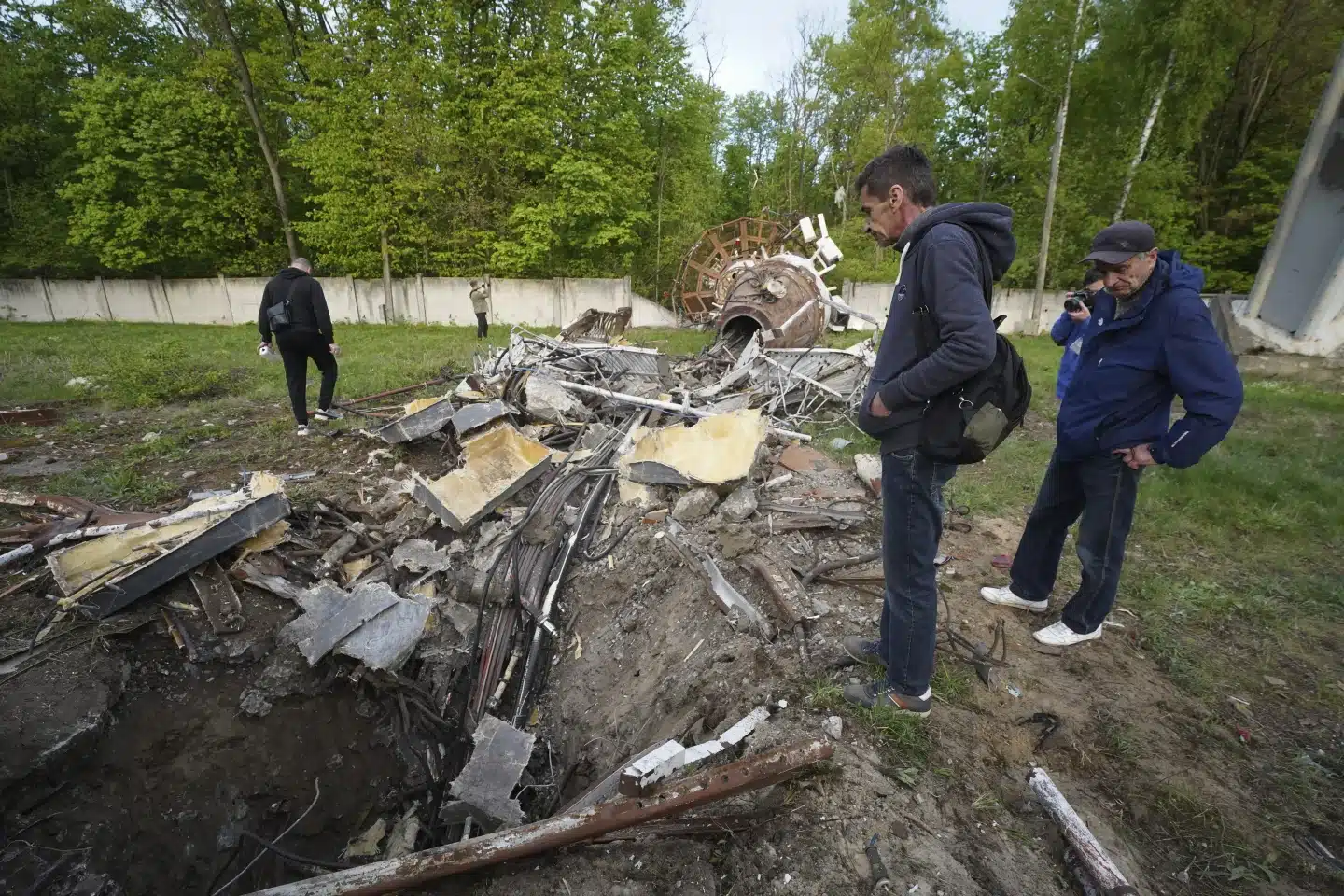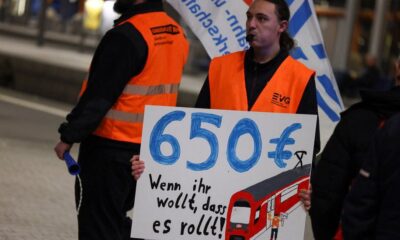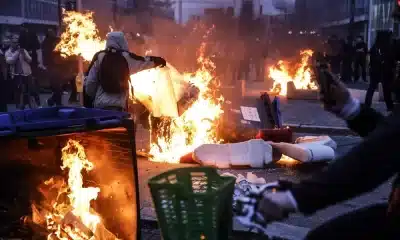U.K News
FRENCH: Unions Buoyant As 1.27 Million French Protest Pension Reform

PARIS, France — According to the Interior Ministry, an estimated 1.27 million people took to the streets of French cities, towns, and villages on Tuesday in massive protests against President Emmanuel Macron’s plans to raise the retirement age by two years.
In a big win for labor unions, more people showed up than at the last round of strikes and protests against the proposed pension system changes. Prime Minister Elisabeth Borne had to say that her government “hears” the “questions and doubts” raised by reforms that would raise the retirement age from 62 to 64.
The eight unions that organized the protests announced new demonstrations for February 7 and 11.
“In the face of widespread opposition, the government must pull back on its reform,” said Patricia Drevon of the Workers’ Force union, who stood with other union members in a rare public show of unity.
According to the powerful CGT union, 2.8 million protesters marched in french on Tuesday.
The Franch Love To Strike
National strikes and protests were a litmus test for Macron and his opponents. The government has said that it is determined to keep Macron’s promise to change French pension system, which he made during the election. But a lot of people will be against the bill, which will help labor unions and left-leaning lawmakers stop it.
Later Tuesday, Prime Minister Borne extended a tentative olive branch to protesters and unions, tweeting: “The retirement reform raises questions and doubts. We can hear them.”
This means that changes are possible, but not necessarily a full withdrawal, which is what protesters have been calling for. According to her tweet, the upcoming debate in parliament “will allow us… to enrich our project with a goal” of ensuring the future of France’s pension system. “We bear responsibility.”
Borne recently stated that raising the retirement age to 64 is “no longer negotiable.” On Monday, Macron defended the reform as “vital.”
According to police, 87,000 people took to the streets in the capital, up from 80,000 in the first major pension protest on Jan. 19, when authorities claimed 1 million people demonstrated nationwide. Estimates from the union had more than doubled that figure.
Radicals And Riot Police Clash
The otherwise peaceful Paris march was marred by sporadic clashes between a small group of black-clad radicals and riot police, who fired tear gas near Les Invalides, the site of Napoleon’s tomb, where the march ended. There were 30 arrests there and along the route, according to police.
11,000 police officers were on duty for an estimated 250 protests across the country.
“The government is currently backed into a corner. “It only needs to withdraw its reform,” Erik Meyer of the Sud Rail union, one of eight unions that organized the march, told BFM TV.
Veteran left-wing leader Jean-Luc Mélenchon praised the protests as “historic” and predicted Macron’s defeat.
“We don’t see such a mass mobilization very often,” he said in the southern city of Marseille. “It’s a type of citizen insurgency.”
The demonstrations were not limited to France’s major cities. On Ouessant, a tiny western isle of about 800 people off the coast of Brittany, about 100 protesters gathered outside Mayor Denis Palluel’s office and marched, he said.
Retiring At A Reasonable Age Is Important To The French People
The prospect of having to work longer hours alarmed mariners on the island with difficult ocean-going jobs, according to Palluel.
“It’s important to retire at a reasonable age because life expectancy isn’t very long,” he says.
Protests by people of all ages were loud and colorful, with sirens, bullhorns, and smoke bombs, continuing a long tradition of taking democracy to the streets in France.
Strikes disrupted services across France on Tuesday, in addition to the protests.
According to SNCF, most train services in Paris, other regions, and France’s flagship high-speed network connecting cities and major towns have been disrupted. Station closures and cancellations also impacted the Paris Metro.
Power workers in key positions, who are not allowed to go on strike, showed their support for protesters by temporarily cutting electricity supplies without causing blackouts, according to the company that makes the electricity, EDF.
Local Striking Impacted Schools
Civil servant Jamila Sariac, 60, believes the pension system should be left alone.
“Social protection is a milestone of our society, a milestone that the government wishes to break,” she said, adding that strikes would put more pressure on the government than protests. “We owe it to our forefathers who contributed to France’s wealth.”
Said Belaiba, who works in construction, was one of the people whose train from Paris to Lyon in the morning was canceled, so he had to wait. Nonetheless, the 62-year-old said he was opposed to the proposed reform.
“My job is physically demanding,” he admitted. “You can’t keep going past 64.”
Strikes also impacted schools, with the Education Ministry reporting that roughly one-quarter of teachers remained absent from work — fewer than in the previous round of protests.
Walkouts in oil refineries were also reported in French media. Because of the strike, radio station France Inter played music instead of its usual morning talk shows and apologized to its listeners.
SOURCE – (AP)
Business
Microsoft And Amazon Face Scrutiny From UK Competition Watchdog Over Recent AI Deals

LONDON — British competition officials announced on Wednesday that they will closely examine recent artificial intelligence agreements made by Microsoft and Amazon. This investigation is prompted by fears that these partnerships may impede competition within the AI business.
The Competition and Markets Authority is currently investigating Microsoft’s collaboration with Mistral AI in France and the company’s recruitment of crucial personnel from Inflection AI, another startup. The agency has also announced a separate investigation into Amazon’s $4 billion purchase of Anthropic, a San Francisco-based company.
AP – VOR News Image
Microsoft And Amazon Face Scrutiny From UK Competition Watchdog Over Recent AI Deals
Due to the increasing interest in generative artificial intelligence (AI) among the public and businesses, major technology corporations have been investing substantial amounts of money into startups. However, these investments have also caught the attention of antitrust authorities.
The regulatory body in the United Kingdom announced that it is inviting feedback from “interested third parties” to determine whether to conduct a comprehensive inquiry into potential antitrust violations.
“We will evaluate, in a fair and unbiased manner, whether each of these three agreements comply with the merger regulations in the United Kingdom and, if they do, whether they have any influence on competition within the country,” stated Joel Bamford, the executive director of mergers at the regulatory body.
Microsoft has committed to supplying the necessary information to the watchdog to facilitate its investigations.

The Globe – VOR News Image
Microsoft And Amazon Face Scrutiny From UK Competition Watchdog Over Recent AI Deals
“The company stated that it believes that common business practices like hiring talented individuals or making a partial investment in an AI startup encourage competition and should not be considered equivalent to a merger.”
Microsoft has recruited Mustafa Suleyman, one of the co-founders of Google’s DeepMind AI research lab, to lead its consumer artificial intelligence division. Additionally, Microsoft hired the chief scientist and several top engineers and researchers from Inflection, Suleyman’s AI startup.
Earlier this year, Microsoft partnered with Mistral, which has quickly gained popularity in France’s AI industry since its establishment last year. Microsoft had previously collaborated with OpenAI, the creator of ChatGPT, which is also under investigation by the CMA.
Mistral expressed its unwavering dedication to collaborating with the CMA during this procedure to guarantee the preservation of its long-term autonomy and market access.
Meanwhile, Amazon has invested billions to acquire a minority share in Anthropic. The two businesses are working together to create foundation models, the basis for the generative AI systems that have gained worldwide recognition.
:max_bytes(150000):strip_icc()/GettyImages-1232270762-53acb3cadc2045a185a0fcf28e840b23.jpg)
Investopedia – VOR News Image
Microsoft And Amazon Face Scrutiny From UK Competition Watchdog Over Recent AI Deals
Amazon stated that it is unprecedented for the CMA to review a collaboration of this nature. “In contrast to partnerships between other AI startups and large technology companies, our collaboration with Anthropic involves a restricted investment, does not grant Amazon a position as a board director or observer, and allows Anthropic to continue running its models on various cloud providers.”
The CMA has announced an increase in its examination of the foundation models industry following the release of a report that emphasized the potential for dominant corporations to enhance their positions through partnerships with significant AI players.
SOURCE – (AP)
U.K News
UN Calls For Investigation Into Mass Graves Uncovered At Two Gaza Hospitals Raided By Israel

The United Nations (U.N.) Gaza The United Nations has urged for a thorough and reliable investigation into the mass graves discovered at two prominent hospitals in war-ravaged Gaza, which were seized by Israeli troops.
According to U.N. spokesman Stephane Dujarric, credible investigators must be granted access to the locations. Additionally, Dujarric emphasized the importance of ensuring the safety of journalists in Gaza so that they may accurately report on the facts.
AP – VOR News Image
UN Calls For Investigation Into Mass Graves Uncovered At Two Gaza Hospitals Raided By Israel
Volker Türk, the U.N. human rights chief, expressed his deep shock at the destruction of the Shifa medical complex in Gaza City and Nasser Hospital in Khan Younis. He also mentioned the disturbing finding of mass graves in and around these facilities after the departure of the Israeli forces.
The individual demanded impartial and open inquiries into the fatalities, emphasizing that “considering the current atmosphere of exemption from punishment, this should involve investigators from the international community.”
“Hospitals are afforded significant protection under international humanitarian law,” Türk stated. “The deliberate act of killing civilians, detainees, and individuals who are unable to participate in combat is considered a war crime.”
Vedant Patel, the spokesperson for the U.S. State Department, expressed deep concern over the accusations of mass graves at the hospitals and confirmed that U.S. officials have formally requested information from the Israeli government.
The Israeli military has excavated the bodies that Palestinians had previously buried as part of their efforts to locate the remains of hostages taken by Hamas during their attack on October 7th, which initiated the war. The soldiers conducted a thorough examination of the bodies in a dignified manner and promptly returned those that did not belong to Israeli hostages to their original location.
The Israeli military asserts that it eliminated or apprehended numerous militants who had sought refuge within the two hospital complexes, although these assertions could not be independently confirmed.

CNN – VOR News Image
UN Calls For Investigation Into Mass Graves Uncovered At Two Gaza Hospitals Raided By Israel
On Monday, the Palestinian civil defense in the Gaza Strip said that they had discovered 283 corpses in a makeshift cemetery located within the primary hospital in Khan Younis. This cemetery was established during the recent period of Israeli forces surrounding the hospital. According to the group, during that period, individuals could not inter the deceased in a designated burial ground and instead excavated graves within the hospital premises.
According to the civil defense, certain corpses were identified as individuals who were slain during the hospital siege. Additional casualties occurred as a result of the Israeli military’s incursion into the hospital.
The hospital strikes have decimated Gaza’s health sector, which is already struggling to handle the increasing casualties resulting from more than six months of warfare, according to Palestinian health officials.
The matter of who is eligible or responsible for an investigation remains uncertain.
Dujarric stated that for the United Nations to carry out an investigation, authorization from one of its main bodies is required.
“I believe it is not appropriate for anyone to make premature judgments about the outcomes or the individuals responsible,” he stated. “I believe that the investigation should have both access and credibility.”
Karim Khan, the head prosecutor of the International Criminal Court, emphasized the importance of investigating any offenses committed by Hamas terrorists and Israeli forces during his visit to Israel and the West Bank in December.
According to Dujarric, the unearthing of the graves serves as an additional justification for implementing a cease-fire, resolving the conflict, ensuring increased humanitarian access and the delivery of essential products, providing enhanced protection for hospitals, and securing the release of Israeli prisoners.

NDTV – VOR News Image
UN Calls For Investigation Into Mass Graves Uncovered At Two Gaza Hospitals Raided By Israel
The Hamas assault that initiated the conflict resulted in the deaths of over 1,200 individuals, predominantly non-combatants, and the abduction of roughly 250 captives. Israel reports that the terrorists currently have approximately 100 hostages and the remains of over 30 additional individuals in their possession.
Local health authorities report that over 34,000 Palestinians have died as a result of Israel’s military campaign in Gaza to eradicate Hamas. Approximately two-thirds of the casualties are comprised of children and women. The devastation of Gaza’s two major cities has resulted in a humanitarian crisis, causing almost 80% of the population in the area to seek refuge in other sections of the besieged coastal enclave.
SOURCE – (AP)
World
A Russian strike on Kharkiv’s TV tower is part of an intimidation campaign, Ukraine’s Zelenskyy says

Kiev, Ukraine — Ukrainian President Volodymyr Zelenskyy said a Russian missile assault that damaged a prominent skyline television tower in Kharkiv was part of the Kremlin’s effort to terrorize Ukraine’s second-largest city, which has been targeted more frequently in recent weeks.
The strike aimed to “make the terror visible to the whole city and to try to limit Kharkiv’s connection and access to information,” Zelenskyy stated in a Monday evening address.
AP – VOR News Image
A Russian strike on Kharkiv’s TV tower is part of an intimidation campaign, Ukraine’s Zelenskyy says
The northeastern Kharkiv region borders the roughly 1,000-kilometer (600-mile) front line where Ukrainian and Russian forces have been fighting for more than two years, following Moscow’s full-scale invasion of Ukraine. During an attrition war, the front line has remained relatively static, focusing primarily on artillery, drones, and trenches.
Since late March, Russia has increased pressure on Kharkiv, ostensibly to exploit Ukraine’s lack of air defense systems. It has battered the local power grid and struck apartment buildings.
On Monday, a Russian Kh-59 missile damaged Kharkiv’s 250-meter (820-foot) TV tower, severing it approximately in half and halting transmissions.
According to a Washington think group, Russia may consider launching a ground assault against Kharkiv.
“The Kremlin is conducting a concerted air and information operation to destroy Kharkiv City, convince Ukrainians to flee, and internally displace millions of Ukrainians ahead of a possible future Russian offensive operation against the city or elsewhere in Ukraine,” according to the Institute for the Study of War, which released an assessment of the situation.
The projected arrival in Ukraine of new military supplies from Western partners in the coming weeks may have spurred Russia to accelerate its attacks before the equipment arrives, the ISW said, adding that capturing Kharkiv would be “a significant challenge” for the Kremlin’s soldiers.
Instead, the Russian military command “may attempt to destroy Kharkiv City with air, missile, and drone strikes, prompting a large-scale internal displacement of Ukrainian civilians,” it stated.
The United States Senate returned to Washington on Tuesday to vote on $61 billion in war aid to Ukraine, following months of delays. Zelensky said US President Joe Biden informed him that the aid will include long-range and artillery capabilities.
“Four priorities are key: defense of the sky, modern artillery, long-range capacity, and to ensure that packages of American aid arrive as soon as possible,” he stated.
Also on Tuesday, Britain offered 500 million pounds ($620 million, 580 million euros) in fresh military supplies for Ukraine, including 400 vehicles, 60 boats, 1,600 missiles, and 4 million rounds of ammunition.
The shipment will also include British Storm Shadow long-range missiles, which have a range of around 150 miles (240 kilometers) and have been effective against Russian targets, according to the British government.
AP – VOR News Image
A Russian strike on Kharkiv’s TV tower is part of an intimidation campaign, Ukraine’s Zelenskyy says
British Prime Minister Rishi Sunak called Zelenskyy on Tuesday morning to confirm the additional aid. He made the announcement during a visit to Warsaw later that day, where he met with Polish Prime Minister Donald Tusk and NATO Secretary General Jens Stoltenberg.
However, the European Union delivered less positive news. EU countries with Patriot air defense systems provided no clear indication Monday that they would be willing to send them to Ukraine, which sorely needs at least seven of the missile batteries.
Ukraine’s army is also outnumbered in the conflict, and increasing the country’s mobilization has been a tricky matter.
Ukrainian Foreign Minister Dmytro Kuleba warned on Tuesday that authorities intend to crack down on young men of conscription age who have relocated abroad, with detailed measures to be announced soon.
“Staying abroad does not relieve a citizen of his or her duties to the homeland,” Kuleba said on the social networking platform X.
Meanwhile, Russia launched 16 Shahed drones and two Iskander-M ballistic missiles over Ukraine’s southern and central areas, the Ukrainian air force reported Tuesday morning. It stated that all but one of the drones were intercepted.
AP – VOR News Image
A Russian strike on Kharkiv’s TV tower is part of an intimidation campaign, Ukraine’s Zelenskyy says
An nighttime attack in Odesa injured nine persons, according to Regional Governor Oleh Kiper. According to Kiper, the injured included two newborns and two children aged nine and twelve. Hennadii Trukhanov, the city mayor, reported that 58 flats in 22 buildings were destroyed.
Among other developments:
A Russian missile strike near Dnipro, Ukraine’s fourth-largest city, injured four people and sent them to the hospital, according to regional governor Serhii Lysak.
Russian forces launched a guided aerial bomb in Kostiantynivka, a city in the eastern Donetsk area, injuring five people riding in a car, according to authorities. Both of them were in critical condition.
SOURCE – (AP)
-
Celebrity5 months ago
Shane MacGowan, Lead Singer Of The Pogues And A Laureate Of Booze And Beauty, Dies At Age 65
-
Entertainment5 months ago
Robert Downey Jr. Won’t Be Returning To The Marvel Cinematic Universe As Tony Stark
-
Politics5 months ago
Former US Secretary Of State Henry Kissinger Dies Aged 100
-
Politics5 months ago
Unveiling the Power and Influence of The Conservative Treehouse
-
Celebrity5 months ago
WWE Hall Of Famer Tammy ‘Sunny’ Sytch Sentenced To 17 Years In Prison For Fatal DUI Crash
-
Sports4 months ago
Saints’ Aggressive Play-Calling Ends Up Coming Back To Hurt Them In Loss To Rams






















































